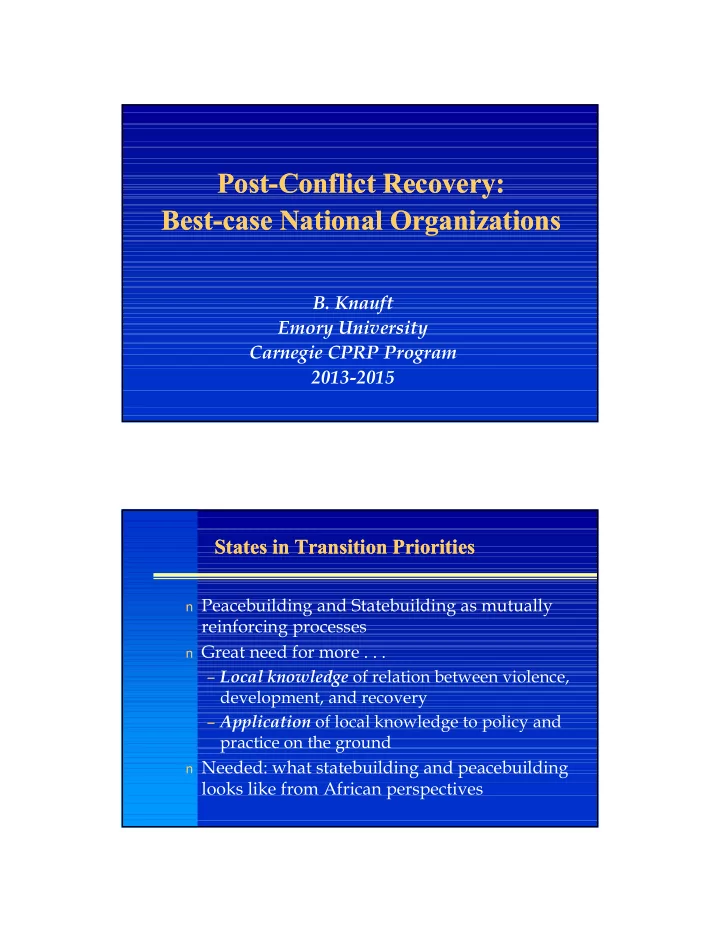

Post-Conflict Recovery: Post-Conflict Recovery: Best-case National Organizations Best-case National Organizations B. Knauft Emory University Carnegie CPRP Program 2013-2015 States in Transition Priorities States in Transition Priorities n Peacebuilding and Statebuilding as mutually reinforcing processes n Great need for more . . . – Local knowledge of relation between violence, development, and recovery – Application of local knowledge to policy and practice on the ground n Needed: what statebuilding and peacebuilding looks like from African perspectives
“Local knowledge/perspectives” “Local knowledge/perspectives” elite professional populace
Peacebuilding vs. Statebuilding Peacebuilding vs. Statebuilding n In poor developing countries, the state is often viewed by the populace as . . . – Corrupt – Predatory – Serving the elite – Dangerous – To be avoided rather than engaged The State <-> Civil strife <-> Peace: The State <-> Civil strife <-> Peace: “It’s easier to break it than to fix it” “It’s easier to break it than to fix it” n State can more easily cause warfare and strife (legitimate / illegitimate violence) . . . n than it can cause peace. n The state depends much more on the populace for promoting peace than for fomenting war / civil strife n State motivation to facilitate peace may be weak n State ability to facilitate peace may be weak
Our key organizational findings Our key organizational findings n Importance of best-case national NGOs/CBOs – Articulating state <-> populace interests – Efficient and committed – Threading the needle – Needles in the haystack – Underappreciated / underfinanced / understudied
Comparative Post-Conflict Comparative Post-Conflict Recovery Project (CPRP) Recovery Project (CPRP) n BEST-CASE focus n Comparative: West Africa -> Asia n Post-conflict / neither-peace-nor-war n “Recovery” ~ sustainable development n Land issues – Developing agrarian economy – Vis-à-vis mining / logging / agribusiness concessions
CPRP principal activities CPRP principal activities n Direct dialogue & learning experience across developing countries in the global south – Identification of CPRP fellows – Monrovia, Liberia workshop (incl. field engagements) – Mandalay, Myanmar workshop (incl. field engagements ) – Development Studies panel & mtgs, London
Challenges Challenges n Identifying appropriate fellows n Limitations on scale / # of fellows n Language = English n South – South travel & visas n Meeting challenges : extraordinary effort and acumen of global Fellows
Content Contributions Content Contributions n Value of direct direct South-South experience and engagement n Level of intellectual <-> practical understanding – +/- Gov’t connections / programs polities – +/- Social activism / movements /resistance n Stated value in confidential exit questionnaires
Larger findings: Larger findings: Best-case national NGOs / CBOs Best-case national NGOs / CBOs n Moderate in size (10-30 employees) n Stably funded for years n High autonomy n High professional morale / commitment n Fiscally responsible n Creative and flexible to gov’t & populace n Emphasis on “giving rather than getting”
Undersupported Connections Undersupported Connections in Peacebuilding in Peacebuilding International donors/programs (needless control) Best-case national NGOs Statebuilding Peacebuilding “Local knowledge/perspectives” “Local knowledge/perspectives” elite professional populace
Thank you to CCNY for sponsorship Thank you to CCNY for sponsorship
Recommend
More recommend